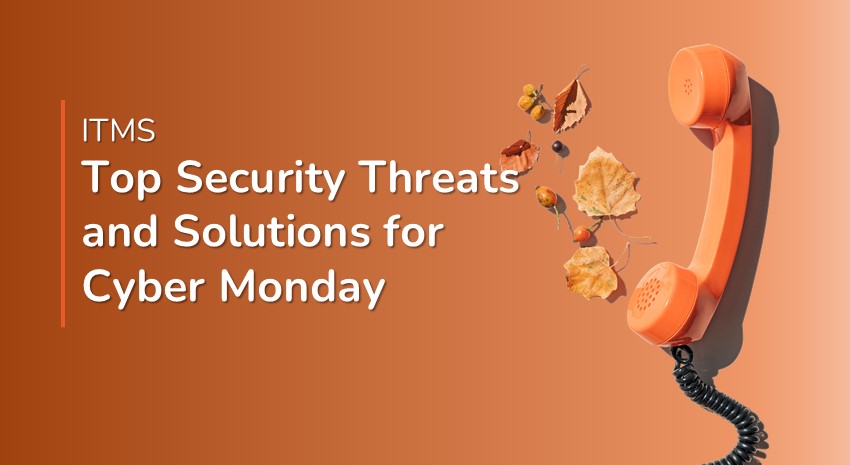Top Security Threats and Solutions for Cyber Monday

Cyber Monday has become one of the most anticipated shopping events for shoppers and retailers. However, the surge in online activity also makes Cyber Monday a prime target for cybercriminals. Threats like phishing, data breaches, and fraud spikes highlight the need for robust security measures.
While the advice might seem repetitious, it is always a good idea to rethink your online security and take precautions to avoid being a victim of cybercriminals.
Here are some of the top threats faced during Cyber Monday and how businesses and consumers can help themselves mitigate risks.
Top Cyber Monday security threats
Bad actors are everywhere and use the same old tricks. While you’re looking for the next great deal, be aware of these threats:
- Phishing attacks – Phishing remains a predominant threat during Cyber Monday. Cybercriminals capitalize on the rush for deals by sending fraudulent emails or text messages designed to impersonate legitimate retailers. These emails often contain malicious links or attachments aiming to steal login credentials or payment details.
- Imposter websites – Another tried-and-true technique used by scammers is to create fake websites that mimic popular retailers. These sites offer unrealistically low prices via email or social media to lure their victims. Once customers enter their personal or financial information, it’s harvested for malicious use. Look for sites with misspellings or are missing “https:” in the URL.
- Distributed Denial of Service (DDoS) attacks – Online retailers are often targeted with DDoS attacks, where servers are overwhelmed with traffic, leading to downtime. Such attacks can disrupt sales, frustrate customers, and tarnish a retailer’s reputation.
- Credential stuffing – Credential stuffing occurs when cybercriminals use stolen username-password combinations to access accounts. With many shoppers reusing passwords, this method becomes particularly effective during the holiday shopping frenzy.
- Payment fraud – Cyber Monday sees a spike in payment fraud, including stolen credit card use and unauthorized transactions. Fraudulent activities are often overlooked within the massive volume of legitimate transactions.
- Malware and ransomware – Malicious software attacks can target both consumers and retailers. For shoppers, malware can steal payment data or lock devices. Retailers face ransomware threats, where attackers encrypt critical data and demand payment for its release. Phishing is a favorite way for cybercriminals to steal the identity of unsuspecting victims.
Security solutions for retailers
While all of these tips are true all year long, they are especially true during the gift-buying season:
- Implement multi-factor authentication – Retailers should adopt multi-factor security systems to protect their websites and customer data. This includes firewalls, intrusion detection systems, and secure payment gateways. Implementing basic two-factor authentication can go a long way toward protecting your customers.
- Use encryption – Encrypting customer data ensures it remains secure during transactions. Retailers should use HTTPS protocols and SSL certificates to safeguard sensitive information.
- Leverage AI and Machine Learning capabilities in your business applications – AI-powered tools can detect unusual activity, such as sudden spikes in login attempts or transactions. Machine learning algorithms help flag and mitigate potential threats in real time.
- Perform regular security audits – Conducting frequent security audits ensures vulnerabilities are identified and patched before attackers can exploit them. This is particularly critical before high-volume events like Cyber Monday.
- Educate staff – Since your employees are your first line of defense, training your staff to recognize phishing attempts and other suspicious activities can significantly reduce risks.
- Update devices and software – Keeping devices and software up to date ensures the latest security patches are installed, reducing vulnerabilities to malware.
Security solutions for consumers
We might be businesspeople by day, but we all become consumers when we are off work. The same advice holds true whether you are on or off the clock:
- Verify website authenticity – Consumers should double-check website URLs before entering payment details. Genuine websites often use “https:” and display a padlock icon in the address bar.
- Be careful responding to emails and text messages – Avoid clicking on links in unsolicited emails or messages. Instead, navigate to a retailer’s website directly by typing the URL into a browser.
- Use strong, unique passwords – Shoppers should use complex passwords for online accounts and avoid reusing them, particularly if they are creating new accounts for multiple online retail sites. Password managers can help generate and store secure credentials.
- Use two-factor authentication (2FA) – Take advantage of multi-factor authentication when it is available from a retailer. Adding that second layer of verification, such as a text message code or fingerprint scan, makes it that much harder for attackers to gain unauthorized access.
- Monitor bank statements – Consumers should regularly check their bank and credit card statements for unauthorized transactions, particularly during and after Cyber Monday.
- Avoid using public Wi-Fi for conducting business – Public Wi-Fi, such as those found at airports and coffee shops, is not secured. Bad actors can monitor network traffic to identify name/password combinations they can exploit. While they might be convenient, these networks are not the place to transmit credit card information or to email sensitive company correspondence. Obtain a personal mobile hotspot or use your phone in these situations.
- Use a dedicated credit card for online purchases to limit exposure – A single credit card with a low credit limit can minimize your financial exposure should your information be compromised. Plus, some credit card companies offer protection from misuse by cyber criminals.
Cybersecurity is everyone’s responsibility
Cyber Monday is not the only time cybercriminals attack, but it is one of their favorite times of the year. Retailers must proactively protect the sensitive information of their customers in order to avoid financial loss and damage to their reputation. Likewise, consumers must remain vigilant and protect their personal information from falling into the wrong hands.
If you need help safeguarding your Business Central environment from bad actors, contact the cybersecurity experts at ArcherPoint.
